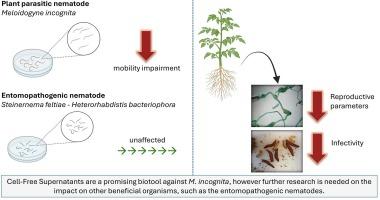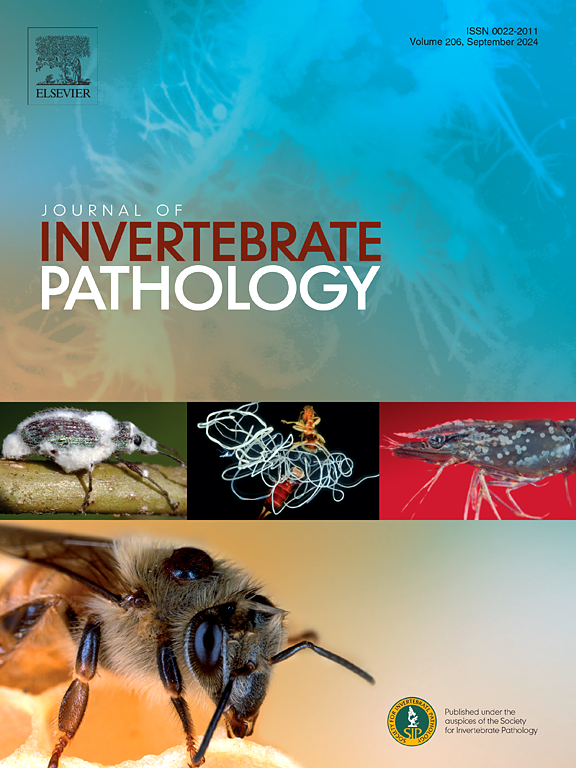Direct effects of Xenorhabdus spp. cell-free supernatant on Meloidogyne incognita in tomato plants and its impact on entomopathogenic nematodes
IF 3.6
3区 生物学
Q1 ZOOLOGY
引用次数: 0
Abstract
Entomopathogenic Xenorhabdus spp. bacteria, symbiont of the nematode Steinernema spp., shows potential for mitigating agricultural pests and diseases through bioactive compound production. The plant-parasitic nematode (PPN) Meloidogyne incognita affects the yield and quality of numerous crops, causing significant economic losses. We speculate that Cell-Free Supernatants (CFS) from Xenorhabdus spp. could reduce the impact of the root-knot nematode (RKN) M. incognita without negatively affecting entomopathogenic nematodes (EPNs), which are considered beneficial organisms. This study explored the activity of seven CFS against M. incognita (two populations, AL05 and Chipiona) and their possible effects on EPNs. The in vitro impact of CFS at 10 %, 40 %, and 90 % concentrations on nematode motility at four and 24 h were tested on the PPN M. incognita and two EPNs, S. feltiae and H. bacteriophora. Additionally, EPN viability and virulence were evaluated at two and five days. On the other hand, tomato plant-mesocosm experiments examined the activity of four CFS on M. incognita reproductive capacity and EPN virulence. In vitro exposure of M. incognita to 90 % concentration of CFS resulted in reductions of activity over 60 % after four hours of expossure in four out of seven CFS. In the in vitro evaluation of two species of EPNs, none of the CFS affected the activity across any tested doses after four hours of exposure nor after 24 h. Plant-mesocosm experiments showed that CFS application significantly reduced RKN galls, egg masses, and galling index. However, the virulence of both EPN species decreased 15 days after application, with a significant impact on S. feltiae. Overall, these findings suggest that CFS could be used as a bio-tool against M. incognita in tomato crops, mitigating its impact on plant growth. However, this study also highlights the necessity of investigating the effects of CFS on non-target organisms.

Xenorhabdus spp.无细胞上清液对番茄植株上的黑僵菌的直接作用及其对昆虫病原线虫的影响
昆虫致病性 Xenorhabdus 菌是线虫 Steinernema spp.的共生菌,通过生产生物活性化合物,显示出减轻农业病虫害的潜力。植物寄生线虫(PPN)Meloidogyne incognita 影响许多作物的产量和质量,造成重大经济损失。我们推测,来自 Xenorhabdus 植物的无细胞超微液(CFS)可以减少根结线虫(RKN)M. incognita 的影响,而不会对被认为是有益生物的昆虫病原线虫(EPNs)产生负面影响。本研究探讨了七种 CFS 对 M. incognita 的活性及其对 EPNs 可能产生的影响。体外测试了 10%、40% 和 90% 浓度的 CFS 在 4 小时和 24 小时内对 PPN M. incognita 和两种 EPN(S. feltiae 和 H. bacteriophora)线虫运动的影响。此外,还在 2 天和 5 天后对 EPN 的活力和毒力进行了评估。另一方面,番茄植株-中生代实验检验了四种 CFS 对 M. incognita 生殖能力和 EPN 毒力的影响。将 M. incognita 体外暴露于 90% 浓度的 CFS 后,七种 CFS 中的四种活性降低了 60% 以上。在对两种 EPN 的体外评估中,无论暴露 4 小时后还是 24 小时后,任何 CFS 都不会影响任何测试剂量的活性。植物-中生代实验表明,施用 CFS 能显著减少 RKN虫瘿、卵块和虫瘿指数。然而,施用 15 天后,两种 EPN 的毒力都有所下降,其中对 S. feltiae 的影响最大。总之,这些研究结果表明,CFS 可作为一种生物工具,用于防治番茄作物中的 M. incognita,减轻其对植物生长的影响。不过,这项研究也强调了研究 CFS 对非目标生物影响的必要性。
本文章由计算机程序翻译,如有差异,请以英文原文为准。
求助全文
约1分钟内获得全文
求助全文
来源期刊
CiteScore
6.10
自引率
5.90%
发文量
94
审稿时长
1 months
期刊介绍:
The Journal of Invertebrate Pathology presents original research articles and notes on the induction and pathogenesis of diseases of invertebrates, including the suppression of diseases in beneficial species, and the use of diseases in controlling undesirable species. In addition, the journal publishes the results of physiological, morphological, genetic, immunological and ecological studies as related to the etiologic agents of diseases of invertebrates.
The Journal of Invertebrate Pathology is the adopted journal of the Society for Invertebrate Pathology, and is available to SIP members at a special reduced price.

 求助内容:
求助内容: 应助结果提醒方式:
应助结果提醒方式:


